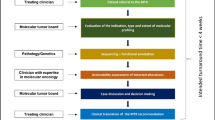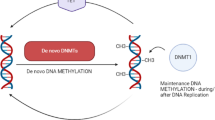Abstract
Background
The CpG island methylator phenotype (CIMP) with multiple promoter methylated loci has been observed in a subset of human colorectal cancer (CRC) cases. CIMP status, which is closely associated with specific clinicopathological and molecular characteristics, is considered a potential predictive biomarker for efficacy of cancer treatment. However, the relationship between the effect of standard chemotherapy, including cytotoxic drugs and anti-epidermal growth factor receptor (EGFR) antibodies, and CIMP status has not been elucidated.
Methods
In 125 metastatic colorectal cancer (mCRC) patients, we investigated how clinical outcome of chemotherapy was related to CIMP status as detected by methylation-specific PCR (MSP) and to genetic status in five EGFR-related genes (KRAS, BRAF, PIK3CA, NRAS, and AKT1) as detected by direct sequencing.
Results
CIMP-positive status was significantly associated with proximal tumor location and peritoneum metastasis (all P values <0.05). The progression-free survival of patients with CIMP-positive tumors receiving sequential therapy with FOLFOX as the first-line treatment followed by irinotecan-based therapy as the second-line treatment (median = 6.6 months) was inferior to that of such patients receiving the reverse sequence (median = 15.2 months; P = 0.043). Furthermore, CIMP-positive tumors showed higher mutation frequencies for the five EGFR-related genes (74.1 %) than the CIMP-negative tumors did (50.0 %). Among the KRAS wild-type tumors, CIMP-positive tumors were associated with a worse clinical outcome than CIMP-negative tumors following anti-EGFR antibody therapy.
Conclusion
Sequential FOLFOX followed by an irinotecan-based regimen is unfavorable in patients with CIMP-positive tumors. High frequencies of mutation in EGFR-related genes in CIMP-positive tumors may cause the lower response to anti-EGFR antibody therapy seen in patients with wild-type KRAS and CIMP-positive tumors.




Similar content being viewed by others
References
Bonasio R, Tu S, Reinberg D (2010) Molecular signals of epigenetic states. Science 330:612–616
Sharma S, Kelly TK, Jones PA (2010) Epigenetics in cancer. Carcinogenesis 31:27–36
van Engeland M, Derks S, Smits KM et al (2011) Colorectal cancer epigenetics: complex simplicity. J Clin Oncol 29:1382–1391
Esteller M (2008) Epigenetics in cancer. N Engl J Med 358:1148–1159
Weisenberger DJ, Siegmund KD, Campan M et al (2006) CpG island methylator phenotype underlies sporadic microsatellite instability and is tightly associated with BRAF mutation in colorectal cancer. Nat Genet 38:787–793
Samowitz WS, Albertsen H, Herrick J et al (2005) Evaluation of a large, population-based sample supports a CpG island methylator phenotype in colon cancer. Gastroenterology 129:837–845
Ogino S, Kawasaki T, Kirkner GJ et al (2007) Evaluation of markers for CpG island methylator phenotype (CIMP) in colorectal cancer by a large population-based sample. J Mol Diagn 9:305–314
Lange CP, Laird PW (2013) Clinical applications of DNA methylation biomarkers in colorectal cancer. Epigenomics 5:105–108
Han SW, Lee HJ, Bae JM et al (2013) Methylation and microsatellite status and recurrence following adjuvant FOLFOX in colorectal cancer. Int J Cancer 132:2209–2216
Shiovitz S, Bertagnolli MM, Renfro LA et al (2014) CpG island methylator phenotype is associated with response to adjuvant irinotecan-based therapy for stage III colon cancer. Gastroenterology 147:637–645
Jover R, Nguyen TP, Perez-Carbonell L et al (2011) 5-Fluorouracil adjuvant chemotherapy does not increase survival in patients with CpG island methylator phenotype colorectal cancer. Gastroenterology 140:1174–1181
Tournigand C, Andre T, Achille E et al (2004) FOLFIRI followed by FOLFOX6 or the reverse sequence in advanced colorectal cancer: a randomized GERCOR study. J Clin Oncol 22:229–237
Jonker DJ, O’Callaghan CJ, Karapetis CS et al (2007) Cetuximab for the treatment of colorectal cancer. N Engl J Med 357:2040–2048
Gibson TB, Ranganathan A, Grothey A (2006) Randomized phase III trial results of panitumumab, a fully human anti-epidermal growth factor receptor monoclonal antibody, in metastatic colorectal cancer. Clin Colorectal Cancer 6:29–31
Lievre A, Bachet JB, Le Corre D et al (2006) KRAS mutation status is predictive of response to cetuximab therapy in colorectal cancer. Cancer Res 66:3992–3995
Allegra CJ, Rumble RB, Hamilton SR et al (2016) Extended RAS gene mutation testing in metastatic colorectal carcinoma to predict response to anti-epidermal growth factor receptor monoclonal antibody therapy: American Society of Clinical Oncology provisional clinical opinion update 2015. J Clin Oncol 34:179–185
De Roock W, Claes B, Bernasconi D et al (2010) Effects of KRAS, BRAF, NRAS, and PIK3CA mutations on the efficacy of cetuximab plus chemotherapy in chemotherapy-refractory metastatic colorectal cancer: a retrospective consortium analysis. Lancet Oncol 11:753–762
Carpten JD, Faber AL, Horn C et al (2007) A transforming mutation in the pleckstrin homology domain of AKT1 in cancer. Nature 448:439–444
Soeda H, Shimodaira H, Watanabe M et al (2013) Clinical usefulness of KRAS, BRAF, and PIK3CA mutations as predictive markers of cetuximab efficacy in irinotecan- and oxaliplatin-refractory Japanese patients with metastatic colorectal cancer. Int J Clin Oncol 18:670–677
Herman JG, Graff JR, Myohanen S et al (1996) Methylation-specific PCR: a novel PCR assay for methylation status of CpG islands. Proc Natl Acad Sci USA 93:9821–9826
Eads CA, Danenberg KD, Kawakami K et al (2000) MethyLight: a high-throughput assay to measure DNA methylation. Nucleic Acids Res 28:E32
Ogino S, Cantor M, Kawasaki T et al (2006) CpG island methylator phenotype (CIMP) of colorectal cancer is best characterised by quantitative DNA methylation analysis and prospective cohort studies. Gut 55:1000–1006
Kim JH, Shin SH, Kwon HJ et al (2009) Prognostic implications of CpG island hypermethylator phenotype in colorectal cancers. Virchows Arch 455:485–494
Barault L, Charon-Barra C, Jooste V et al (2008) Hypermethylator phenotype in sporadic colon cancer: study on a population-based series of 582 cases. Cancer Res 68:8541–8546
Iacopetta B, Kawakami K, Watanabe T (2008) Predicting clinical outcome of 5-fluorouracil-based chemotherapy for colon cancer patients: is the CpG island methylator phenotype the 5-fluorouracil-responsive subgroup? Int J Clin Oncol 13:498–503
Van Rijnsoever M, Elsaleh H, Joseph D et al (2003) CpG island methylator phenotype is an independent predictor of survival benefit from 5-fluorouracil in stage III colorectal cancer. Clin Cancer Res 9:2898–2903
Min BH, Bae JM, Lee EJ et al (2011) The CpG island methylator phenotype may confer a survival benefit in patients with stage II or III colorectal carcinomas receiving fluoropyrimidine-based adjuvant chemotherapy. BMC Cancer 11:344
Scartozzi M, Bearzi I, Mandolesi A et al (2011) Epidermal growth factor receptor (EGFR) gene promoter methylation and cetuximab treatment in colorectal cancer patients. Br J Cancer 104:1786–1790
Ouchi K, Takahashi S, Yamada Y et al (2015) DNA methylation status as a biomarker of anti-epidermal growth factor receptor treatment for metastatic colorectal cancer. Cancer Sci 106:1722–1729
Acknowledgments
This study was supported in part by grants-in-aid from the Ministry of Education, Science, Sports and Culture. We thank Hiromi Nakata for assistance with the mutational analysis as well as Mareyuki Endo at Sendai Kosei Hospital, Hiroyoshi Suzuki at Sendai Medical Center, and Yayoi Takahashi at Tohoku University Hospital for preparing samples.
Author information
Authors and Affiliations
Corresponding author
Ethics declarations
Conflict of interest
Chikashi Ishioka has received research funding from Chugai Pharmaceutical Co. Ltd. and Taiho Pharmaceutical Co. Ltd.
Additional information
Xiaofei Zhang and Hideki Shimodaira have equally contributed to this work.
About this article
Cite this article
Zhang, X., Shimodaira, H., Soeda, H. et al. CpG island methylator phenotype is associated with the efficacy of sequential oxaliplatin- and irinotecan-based chemotherapy and EGFR-related gene mutation in Japanese patients with metastatic colorectal cancer. Int J Clin Oncol 21, 1091–1101 (2016). https://doi.org/10.1007/s10147-016-1017-6
Received:
Accepted:
Published:
Issue Date:
DOI: https://doi.org/10.1007/s10147-016-1017-6




